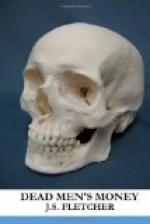“And you’ve never heard of your brother’s having been seen in Liverpool of late?” he went on. “Never heard that he called to see any old friends at all? For we know, as you have seen in the papers, Mrs. Hanson, that he was certainly in Liverpool, and bought clothes and linen there, within this last three months.”
“He never came near me, sir,” she said. “And I never heard word of his being there from anybody.”
There was a bit of a silence then, and at last the woman put the question which, it was evident, she was anxious to have answered definitely.
“Do you think there’s a will, mister?” she asked. “For, if not, the lawyer I went to said what there was would come to me—and I could do with it.”
“We’ve seen nothing of any will,” answered Mr. Lindsey. “And I should say there is none, and on satisfactory proof of your being next-of-kin, you’ll get all he left. I’ve no doubt you’re his sister, and I’ll take the responsibility of going through his effects with you. You’ll be stopping in the town a day or two? Maybe your mother, Hugh, can find Mrs. Hanson a lodging?”
I answered that my mother would no doubt do what she could to look after Mrs. Hanson; and presently the woman went away with Maisie, leaving her papers with Mr. Lindsey. He turned to me when we were alone.
“Some folks would think that was a bit of help to me in solving the mystery, Hugh,” said he; “but hang me if I don’t think it makes the whole thing more mysterious than ever! And do you know, my lad, where, in my opinion, the very beginning of it may have to be sought for?”
“I can’t put a word to that, Mr. Lindsey,” I answered. “Where, sir?”
“Panama!” he exclaimed, with a jerk of his head. “Panama! just that! It began a long way off—Panama, as far as I see it. And what did begin, and what was going on? The two men that knew, and could have told, are dead as door-nails—and both buried, for that matter.”
So, in spite of Mrs. Hanson’s coming and her revelations as to some, at any rate, of James Gilverthwaite’s history, we were just as wise as ever at the end of the first week after the murder of John Phillips. And it was just the eighth night after my finding of the body that I got into the hands of Abel Crone.
Abel Crone was a man that had come to Berwick about three years before this, from heaven only knows where, and had set himself up in business as a marine-store dealer, in a back street which ran down to the shore of the Tweed. He was a little red-haired, pale-eyed rat of a man, with ferrety eyes and a goatee beard, quiet and peaceable in his ways and inoffensive enough, but a rare hand at gossiping about the beach and the walls—you might find him at all odd hours either in these public places or in the door of his shop, talking away with any idler like himself. And how I came to get into talk with him on that particular night was here: Tom Dunlop, Maisie’s young brother, was for keeping tame rabbits just then, and I was helping him to build hutches for the beasts in his father’s back-yard, and we were wanting some bits of stuff, iron and wire and the like, and knowing I would pick it up for a few pence at Crone’s shop, I went round there alone. Before I knew how it came about, Crone was deep into the murder business.




